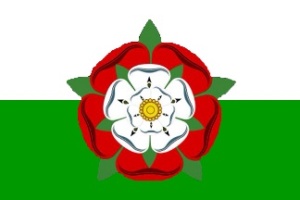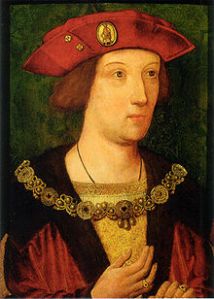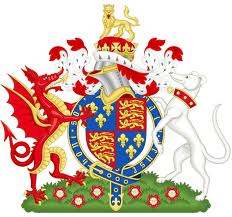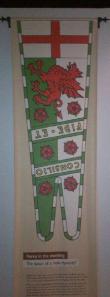To the average member of the public, no Royal Dynasty has come to represent England and Englishness as the Tudors, a multi-generational 16th Century force that dragged England out of the bleak and dreary middle ages and into the renaissance period that enabled the Kingdom to become a superpower on the global scene. England became a mighty nation during the reign of sequential Tudors, rapidly growing in a self-assurance and assertiveness that would later blossom into the dominant British Empire under their successors. It was under this Dynasty that England broke with Rome, that the English vanquished their aggressive Spanish foe through the defeat of the infamous Armada and that the world was given the immortal playwright William Shakespeare. Arguably the most overlooked Tudor monarch is the very man who began the dynasty, Henry Tudor, that great opportunist who is arguably one of the country’s greatest overachievers. Born fatherless and then nobly imprisoned until he was forced into exile as a teenager, this wise, calculating and intelligent man was transformed from a penniless rebel into a flourishing sovereign during dramatic morning in August 1485.
Often overlooked by many is that Henry Tudor, the King of England and father of the majestic Tudors, was a Welshman, born and bred in the land of his fathers. Yet how has this great and incredibly successful monarch been overlooked by a Welsh nation which prides itself on its history and is quick to acclaim their sons. The argument goes that as a Welshman who became a King of England, Henry turned his back on his fellow compatriots and is the source of all future acts of oppression emanating from the English side of Offa’s Dyke. He was a Welshman who should have freed Wales after two centuries of English occupation, a fellow Cymro who nonetheless hated Wales and was ashamed of his background. These modern Welsh Nationalists, an ideology which I do subscribe too it must be said, are keen to point out that Henry’s son King Henry VIII, that mighty tyrant of that turbulent era, introduced the Acts of Wales which annexed Wales into her superior neighbour, a situation that remains a bone of contention some 500 years later. Yes, the argument goes that Henry Tudor, as broadcaster Huw Edwards pointed out in the BBC’s Story of Wales production, was just another English king. We Welsh have a word for a Welshman whom moves to England, speaks English and denies his Welshness and that is a Dic Sion Dafydd, a term of similar sentiments to the derivative usage of Uncle Tom in parts of the United States.
This consideration of Harri Tudur to be an enemy of Wales, or at least some with a degree of antipathy towards his homeland, seems to be a modern comprehension, developed over the last century. Contemporary Welshmen certainly viewed the Tudors as a friendly force, the existence of praise poetry alone suggesting there was an audience for praising the family. The poet Sion Tudur proudly proclaimed to Henry’s granddaughter, the glorious Elizabeth I;
“Harri lan, hir lawenydd,
Yn un a’n rhoes ninnau’n rhydd,
I Gymru da fu hyd fedd,
Goroni gwr o wynedd”
“Fair Harry, our long lasting joy,
The one who set us free,
Good was it for Wales all his life,
That the man of Gwynedd was crowned”
Elsewhere other poets of the period extolled the ascension of Henry Tudor, including Huw Machno during the late Elizabethan period when he wrote;
“O bu I Gymru I gyd,
Drwy anap, flinder ennyd,
A’I rhoi yn gaeth, waethwaeth oedd,
A’I thai araul a’I thiroedd,
Yn rhwydd o hyn I’n rhyddhau,
Yn frenin iownfawr rannau,
Iesu erom rhoes Harri,
Seithfed yn nodded inni”
“If it befell that all Wales through mishap,
A long weariness, was put in chains,
Worse and worse it became for her fair homes and lands,
Swiftly from this to free us, as a king of great and good parts,
Jesus gave us Henry VII as our protector”
Henry also received such praise of his Welsh heritage to his face, such as at Worcester in 1486 when he was greeted with a poem proudly extolling his bloodline and the belief that he was fulfilling the ancient Welsh prophecies of taking the crown back from the English;
“Cadwaladers Blodde lynyally descending,
Longe hath bee towlde of such a Prince comyng,
Wherfor Frendes, if that I shal not lye,
This same is the Fulfiller of the Profecye”
This idea that the rise of the Welsh Tudors was beneficial to the Welsh people continued after the dynasty was replaced by the Stuarts, although it should be noted that they were direct descendants of Henry Tudor through his daughter Margaret. The poet Edward Morris continued the theme of Henry having saved the Welsh people from the aggressive Norman yoke by declaring;
“Nes cael brenin, gwreiddin gras,
Arch deryn ar ucha’i deyrnas,
O Frutanwaed, fryd doniau,
Dan ei rwysg i dynnu’r iau”
“Until we had a king, rooted in grace,
Chief ruler of all his kingdom,
A man of British blood, of splendid gifts,
Under his power to free us from the yoke”
In 1507 at the stately Carew Castle in West Wales a lavish celebration was hosted by the great South Welsh warrior Sir Rhys ap Thomas, the loyal soldier whom greatly assisted Henry during the Bosworth campaign and later battles. More than two decades of Tudor rule had passed by the time Sir Rhys held his celebration of his master, the climax of which was the embrace between two figures dressed up as St David and St George, symbolising the hitherto absent unity now felt between the Welsh and English. It was a unity that had only been able to grow under Henry Tudor. The idea that Henry had betrayed the Welsh people by becoming King of England and not empowering the Welsh people as an independent nation can therefore be rejected as absurdity. It was even recorded by a Venetian emissary shortly after Henry had become King that “the Welsh may be said to have recovered their former independence, for the most wise and fortunate Henry VII is a Welshman”. This loyalty that he possessed amongst his countrymen can certainly be considered a possibility the Reformation under his son was taken with little protest amongst the devoutly Catholic Welshmen of 1530’s Wales. Elsewhere in England rebellions and uprisings were a regular feature of the Tudor reign, including major revolts in Cornwall and Yorkshire. Wales never rose up in arms against the Tudors, who they considered to be one and the same with their best interests at heart.
It is the Acts of Wales that draws the greatest ire from modern Welshmen with regards to the Tudors and can be considered the key reason that Henry Tudor is often overlooked as a Welsh hero, regardless of the fact the he had died almost thirty years before their enacting. On a personal note I do agree that it is these acts which today strongly deny Wales the opportunity to seek self-rule, however during the 16th Century it is undeniable that these improved the quality of life for the average Welshman by raising them from inferior subjects to those on an equal footing with their English counterparts. Whilst it is simple to condemn the Acts today for demanding that usage of the Welsh language must be outlawed if a Welshman wished to serve public office, one must consider that the prospect of even serving in public office or getting any degree of equality with the English was vehemently denied to the Welshmen pre-Bosworth. One must only consider the various courtiers of Welsh descent who begun to prosper in English circles during the latter reign of Henry VIII and then through Elizabeth’s sovereignty, none more so than Thomas Cromwell and William Cecil.
Anyone that studies Henry Tudor in any depth however will quickly begin to realise that this accusation of anti-Welshness, or embarrassment of his Cymric roots, has no real academic or historical basis other than an assumption based on Wales having never achieved self-sovereignty during the rule of him or his descendants. Anecdotal evidence of Henry, always taken with a pinch of salt it must be conceded, would indicate that the first Tudor monarch was certainly proud of his roots and broadcast this to his English Kingdom in a way no prominent Welshman had been able to during the medieval period. Let’s consider the evidence that suggests King Henry VII, the first Welsh King of England, was proud of both his roots and by extension his homeland.
- After winning the Battle of Bosworth and ascending to the throne as King Henry VII, one of the most pressing concerns for the former Harri Tudur was to be crowned King at Westminster Abbey, an act in itself that would solidify and confirm his kingship. The ceremony was conducted on the 30th October, 1485 and Henry was solemnly declared “by the grace of god, King of England and of France, Prince of Wales and Lord of Ireland”. This was significant for Henry was the first reigning monarch of England before and since to assert his own right to the title Prince of Wales as opposed to it solely being kept in reserve for the heir. Henry certainly felt this was his right as a Welshman himself, especially when he considered his own descent from such great Welsh Princes as Hywel Dda, Rhodri Mawr, The Lord Rhys and Cadwaladr. Although he would not keep the title for himself, preferring to bestow it upon his eldest son once he had been born an heir, the very act of including the reference to Wales during his coronation is a reminder of his innate sense of Welshness and desire to be seen as a son of Wales. The Welsh of today may consider Owain Glyndwr to be the last native Prince of Wales, but in fact it was Owain’s kinsman Henry Tudor who has the rightful claim to this title.
- During the fifteenth century, the propensity for noble names tended to be limited to such names as Richard, Edward, Henry and Thomas. It would certainly have been with a degree of surprise to the English therefore when Henry named his eldest son and heir Arthur, a name steeped in Welsh mythology and folklore. Henry claimed to be descended from the great Briton hero Arthur and as such he commanded his son, and the hope of the dynasty, would bear the same name as this illustrious and venerated ancestor. It was a decision that would have been greeted warmly within Wales, where Arthur has always remained loved. Although Henry had initially used the Prince of Wales title for himself, as per tradition once his eldest son had reached a suitable age, he bestowed the title of Prince of Wales upon him to underline his position as heir to the crown. Thus Arthur Tudor became Prince of Wales and the promise of another King Arthur became reality for the countrymen of Wales who still fostered hopes that the ancient King of the Britons would one day return to lead them. As we all know, the prospect of a King Arthur was never realised with the early death of the Prince at the age of 15.
- Perhaps the greatest visual indicator of Henry’s pride in his Welsh roots can be found in his personal Coat of Arms which he adopted after his ascension. Coat of Arms were vitally important during the medieval period and help to distinguish and identify the wearer during both peacetime and war. The Royal Coat of Arms in particular were an important status symbol and certainly acted as a form of propaganda in fostering support for the bearer. Although entitled and expected to maintain the basic quartered arms of the Kingdom of England and France, Henry was able to replace his predecessors’ White Boar supporters for those of his own and his choices are telling. For the right supporter he chose a Greyhound, the symbol of his maternal Beaufort family through which he had claimed his right to the English crown. For the left however he selected the Red Dragon of Cadwaladr, a symbol that had become recognisable as that of the Welsh nation due to its connection to the great 7th Century Welsh King Cadwaladr, from which Henry claimed descent. Henry had utilised this Red Dragon during his Bosworth campaign, his battle standard containing the dragon which undoubtedly aided in his recruiting of Welsh troops during his march through his homeland. After the victory the pious and devout Henry visited St Paul’s Cathedral where he gently placed his Dragon banner on the altar. As with the Tudor unity rose, Henry proceeded to ensure his Coat of Arms were placed in as many ubiquitous spots as possible, the conspicuousness of the Dragon a reference to the new power of this previously unheralded Welshman. King’s College in Cambridge is a textbook example of the lengths the Tudors went to in broadcasting their sovereignty via the Coat of Arms, the dragon featured prominently throughout the structure. Furthermore, not only did Henry ensure the dragon was emblazoned on his horses during his coronation, he also created a new pursuivant officer of arms during these celebrations which he specifically named Rougedragon, or Red Dragon. The Dragon was known to be a symbol of Wales, and under Henry Tudor, it featured in every conceivable place throughout the kingdom as his own personal emblem and officially as his Royal Coat of Arms. Wales and Henry Tudor had become synonymous.
- St George has been considered the patron Saint of England since the early 13th Century and his importance to the English royal family was furthered under Edward III during the 14th Century. That being said, it was under Henry Tudor that St David, the patron Saint of Wales, begun to make headway in English royal circles. Henry had many Welshmen in his employ in the aftermath of Bosworth and he acknowledged their nationality by regularly funding their St David’s Day festivities. For a King who has earned a reputation for his apparent spendthrift attitude this would indicate a sincere desire to pay tribute to the Saint who hailed from the same county as the King did. Household records show payments made for St David’s Day to Henry’s Welsh guardsmen out of his own privy purse whilst other payments are made by both Henry and his son for leeks. Although St George was the most important saint for an English King for official means and the Breton St Armel was Henry’s favoured personal religious figure, it is clear that St David was important to the King and should be commemorated with respect in his court.
- When Henry became King, scores of Welshmen flocked to London seeking patronage to make their fortunes and they would not be disappointed by their Welsh King. He employed a Welshman, Lewis Caerleon, as his personal physician whilst a man named David Owen was his carver. His personal bodyguard, the Yeoman of the Guard, included many Welshmen who and it is believed that one in four present at his funeral in 1509 were Welsh. He certainly encouraged his compatriots to make a new living in London and one, Edward Apryse, was given a beerhouse in Fleet Street which he named ‘The Welshman’. Lots of lesser men were given grants and offices on an unprecedented scale including Sheriffs, Constables, Coroners, Bailiffs etc. His uncle Jasper Tudor was made Duke of Bedford and Justicar of South Wales; Rhys ap Thomas was made chamberlain of South Wales and William Gruffudd Chamberlain of North Wales. John Morgan and Edward Vaughan became Bishops of St David’s and Dafydd ab Ieuan and Dafydd ap Owain became Bishop’s of St Asaph, roles which had previously been excluded from Welshmen. He also allowed Welshmen to become Justices of the Peace for the first time.
- Eager to refute the lingering accusations from Yorkists that his paternal bloodline included Bastard Welsh servants, Henry commissioned the Canon of Hereford to specifically look into his Welsh pedigree and to confirm his descent from the most prestigious of native British Princes. Henry was certainly proud of his descent from the Welsh royals and his interest in his genealogy underlines this, particularly as it was the side of his family to which he didn’t owe his claim to the throne. Henry ordered the Canon and Welshman Dr Owen Poole to investigate this bloodline and he spent time traversing Wales before offering his findings to an expectant King.
- Henry Tudor’s ancestors, the Tudur’s of Penmynydd, had been actively involved in the Welsh uprising of their cousin Owain Glyndwr during the early 15th century and after that revolt was crushed, the surviving Welsh people were punished with strict and oppressive Penal Laws. A key policy of these repressive laws was the statute that it was illegal for Welshmen to buy land in England or in English-administered boroughs within Wales, putting them at a major disadvantage in comparison to their English equivalents who had the opportunity to increase their wealth and status. Henry began to reverse these laws, partly for economic reasons but also surely as a method of thanksgiving to the people who had played a major role in him attaining the throne. Henry introduced charters of privilege to the Lordship of Bromfield and Yale in 1505, Chirk and Denbigh in 1506, Ceri and Cydewain in 1507 and Ruthin in 1508. This allowed those Welshmen in this area the right to buy and hold land in England and the English boroughs of Wales, freed from expensive and burdensome financial payments implemented in earlier post conquest laws. They were also allowed to inherit land in the process of primogeniture which finally allowed the Welsh to build up power bases. This also encouraged trade between England and Wales and put them on equal footing. Wales was also included in provisions and improvements made to English law as well. Such an exposure to the English way of life would have been greatly welcomed by the Welsh of the region, whom had long been punished and excluded due to their nationality, a form of medieval apartheid.
- George Owen of Henllys was an Elizabethan antiquarian who was noted for his work on the history and geology of his native Pembrokeshire. It is from him that a story persists regarding Henry Tudor on his death bed whereupon he is said to have stated to his teenage son and successor Prince Henry to take special care of the people of Wales. It was a special charge that father was issuing to son, something that the Welsh considered to be realised almost thirty years later by the Acts of Wales. Although it is unlikely this happened, although not necessarily impossible, the fact that such stories were able to be seriously entertained by the Welshmen of the Tudor period once more underlines the feeling of compatriotship many felt with Henry VII and a sincere belief in his love for Wales.
- Henry Tudor employed a Frenchman, Bernard Andre, as tutor for his son Arthur and commissioned this scholar to become his official court historian. Andre discussed the King’s genealogy and it is striking to see that particular emphasis is once more concentrated on the Welsh, or British, origin of his master as opposed to the maternal descent for which he owed his claim to the throne. The concentration on Henry’s Welsh descent had to have been authorised by the King himself and it once more underlines Henry’s pride in his bloodline, a pride that allowed him to consent to its examination in detail in such a high profile manner by Andre.
- Henry’s pride and depth of feeling for Wales can also be understood from letters in his own hand whilst he was preparing his invasion from France in the run up to the Battle of Bosworth. Henry had specifically chosen to land his forces in West Wales, an area he knew from his childhood and an area he reasonably expected to gain support in. Shrewdly writing ahead of his landing to various Welshmen to procure their support, in one particular letter to the North Welshman John ap Meredith, a kinsman of his, Henry referred to their homeland as “our Principality of Wales” and pledging to free his countrymen from oppression. Henry also stated he would save the Welsh, “delivering them of such miserable servitude as they have piteously long stood in”.
- Henry had been born and bred a Welshman; he lived in Pembroke and then Raglan from his birth until his enforced exile at 14 years old in 1471. Whilst it has never been acknowledged beyond doubt that he was a Welsh speaker, he certainly maintained a love and respect of Welsh culture. Apart from his respect of St David’s Day, Henry had a love of poetry and prophecy in addition to a keen interest in Welsh music. It was stated that after the death of his wife Elizabeth in 1503 only the soothing sounds of Welsh harpists could calm him. He had also personally paid for the burial of a harpist in 1501 and was known to reward those Welsh musicians who pleased him with their talents. There were also mysterious payments from his privy purse to a Welsh woman of Pembrokeshire and he employed his old Welsh nurse to care for his second son, Prince Henry. Furthermore, when his half-uncle David Owen died, Henry offered payment for his funeral, a last tribute to a man he had knighted after the Bosworth campaign and of whom he never showed his embarrassment. It is indisputable that Henry remained a proud Welshman for the entirety of his days and it is high time this West Walian is acknowledged by his countrymen.



